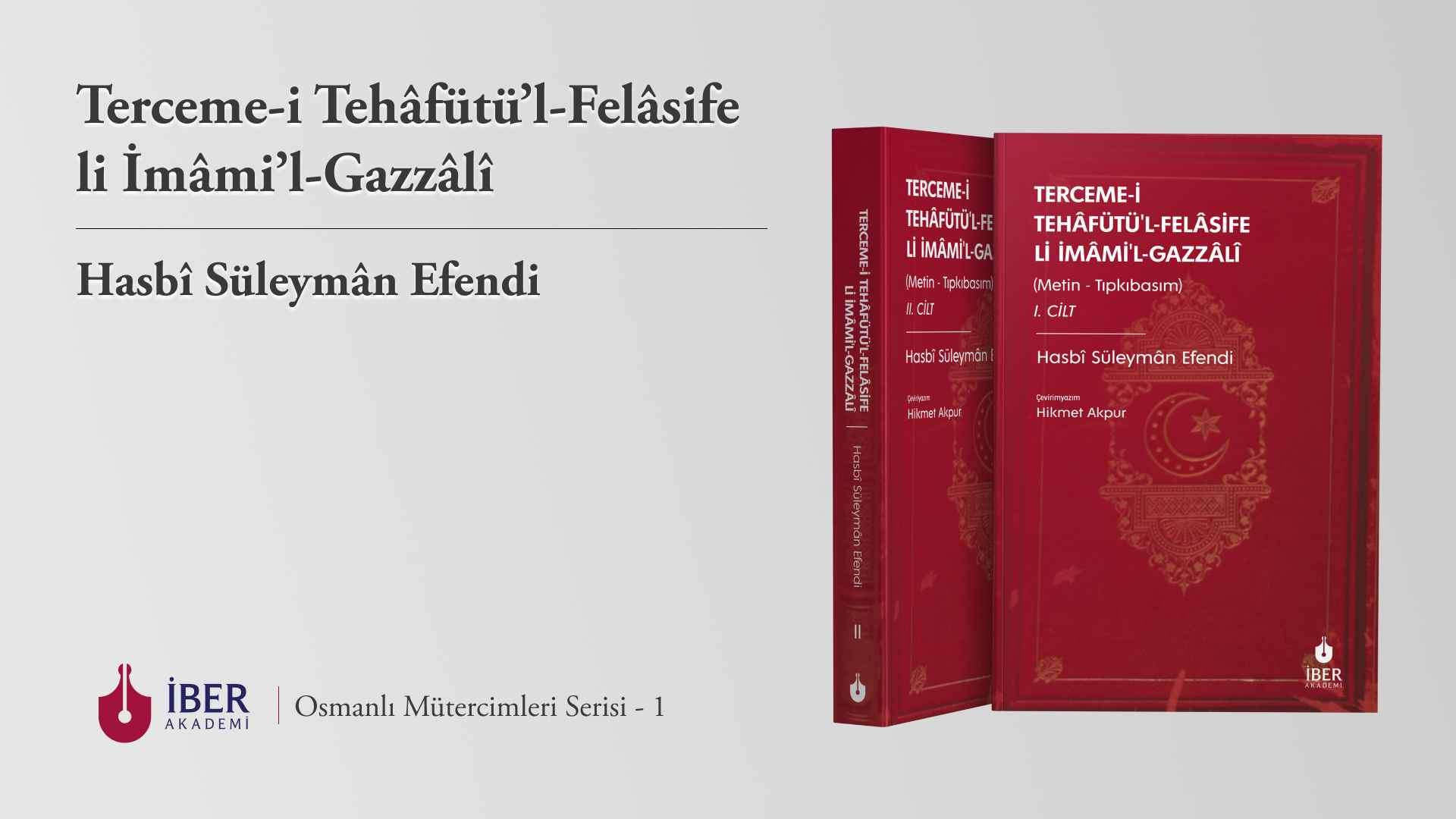


“Osmanlı Mütercimleri Serisi”nin ilk kitabı olan Hasbî Süleymân Efendi’nin “Tehâfütü’l-Felâsife Li İmâmi’l-Gazzâlî” adlı eseri ile “İslam Felsefesi Serisi”nin ilk kitabı olan Tahir Uluç’un “Suhrawardī’s Criticism of The Philosophy of Ibn Sīnā” adlı eseri, İber Akademi Yayınları’ndan okurla buluştu.
Kitaplar seçkin kitapevlerinden ve online kitap satış sitelerinden temin edilebilir.
Osmanlı modernleşmesinin matbûât ve tedrisât sahalarındaki tezâhürlerinden biri, hiç şüphesiz, Tanzimat’tan itibaren resmî kurumlar ve teşvikler aracılığıyla ivme kazanan tercüme faaliyetleridir. Bu bağlamda dikkat çeken temâyüllerden biri, hassaten II. Abdülhamid döneminde, yeni ilmî-kelâmî-felsefî eserlerin telifinin yanı sıra, Osmanlı klâsik ilmî geleneği çerçevesinde Arapça asıllarından tedrîs edilen kadim mirasın aslî eserlerinin Türkçe tercümelerinin yaygınlaşmasıdır. Söz konusu klâsik kaynakların, 19. yüzyılı etkisi altına alan Batı kökenli felsefî-fikrî cereyanlar karşısında yeni bir bakışla gündeme getirilmesi ve modern usûlde eğitim gören daha geniş bir okur çevresine sunulması bu temâyülün ortaya çıkmasında belirleyici olmuştur.
Latin harfleriyle ilk defa yayınlanan bu eser, Osmanlı döneminde daha önce birçok eseri Türkçeye tercüme edilmiş İmam Gazzâli’nin Tehâfütü’l-Felâsife’sinin II. Abdülhamid dönemi ser-küttâblarından mütercim Hasbî Süleymân Efendi tarafından 1891 senesinde tamamlanan tercümesidir. Dîbâce’sinde “sultanın emriyle” kaleme alındığı belirtilen bu tercümenin ehemmiyeti, İslâm klâsik ilim geleneğinden henüz kopmamış bir idrâkin, ilmin ve lisânın tezâhürü olmasında yatmaktadır.
In Suhrawardī’s Criticism of the Philosophy of Ibn Sīnā, Tahir Uluç conducts an epistemological discussion on the relation between philosophy and mysticism. In this context, he aims to go beyond the common opinion, which assumes that in Islamic thought, philosophy depends mostly on rational means in its quest for truth, theology rests primarily on revelation and Sufism on mystical experience and vision. Throughout his study, he investigates the following question: Are the legitimate domains of operation of philosophy and mysticism as clearly distinguished from each other as this assumption suggests, or do they share a common domain?
In answering this question, he suggests that Suhrawardī’s intention by this criticism is not to eradicate speculative philosophy in general and Peripateticism in particular, unlike the case in Ghazālī, but to transform it into a theoretical basis upon which to build his own Illuminative (Ishrāqī) system. In fact, Suhrawardī clarifies that one cannot understand the Ḥikmat al-Ishrāq, in which he provides a full exposition of his overall philosophical project unless one is well versed in the Peripatetic philosophy.
In this perspective, Uluç demonstrates how the criticism of Peripateticism is an essential and integral part of Suhrawardī's endeavor to build a theoretical basis for his Illuminative philosophy, which depends primarily on mystical experience and vision. Accordingly, this book has a twofold purpose. First, it examines from what epistemological point of view Suhrawardī finds the Peripatetic philosophy inadequate and on which principles he criticizes it. Secondly, it presents an in-depth analysis of how Suhrawardī, who regards himself as a philosopher and his endeavor as philosophical, transforms the Peripatetic philosophy into an instrument and prelude that would serve the Illuminative philosophy.